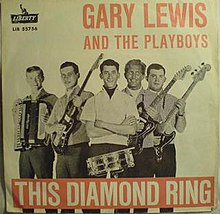This Diamond Ring
"This Diamond Ring" is a 1965 song written by Al Kooper, Bob Brass and Irwin Levine. It was first recorded by Sammy Ambrose on Musicor #1061, then by Gary Lewis & the Playboys[1] on Liberty #55756. Lewis' version charted first, #101 on the January 2, 1965, Billboard "Bubbling Under" chart. Both versions charted on January 9, Lewis still at #101 and Ambrose at #117. Ambrose dropped off the charts at that point, but Lewis made #65 on the Billboard Hot 100 chart the next week (January 16) and his version continued to climb until it reached #1 on February 20, 1965.
Gary Lewis & the Playboys version
| "This Diamond Ring" | ||||
|---|---|---|---|---|
 | ||||
| Single by Gary Lewis & the Playboys | ||||
| from the album This Diamond Ring | ||||
| B-side |
| |||
| Released | January 1965 | |||
| Recorded | November 30, 1964 | |||
| Genre | Pop rock | |||
| Length | 2:01 | |||
| Label | Liberty | |||
| Songwriter(s) | Al Kooper, Bob Brass, Irwin Levine | |||
| Producer(s) | Snuff Garrett | |||
| Gary Lewis & the Playboys singles chronology | ||||
| ||||
According to David Brackett, Lewis' vocals were heavily supported by Ron Hicklin's overdubs.[2] The session drummer was Hal Blaine,[3] Joe Osborn played bass[4] and Leon Russell both played keyboards and arranged the music. The song was produced by Snuff Garrett.[citation needed] Lewis has denied claims that the Playboys did not play on the record, and says that not only was the band largely self-contained, but the Wrecking Crew session musicians only came to do overdubs or solos.[5]
Stylistically, the song's recording features the then common "basic 'combo' instrumentation...(electric guitar, organ, bass, drums), modal (dorian) inflections in the harmony and melody of the verse and a basic rock beat pattern." Unusually the chorus features timpani and the transition between verse and chorus creates a daring modulation from C minor (dorian) to G-flat major.[6] "The musical style," writes Brackett, "skims aspects from contemporary rock songs, and is then produced and arranged from the vantage point of 'easy-listening' music." The song's harmonic progression resembles those of Beatles songs such as the G-flat/F/E-flat/D-flat descending bass line ("Bad to Me") and the vi-iii movement ("Please Please Me," "I Want to Hold Your Hand," "She Loves You," "And I Love Her," and others). The melodic turn on "true" of "if you find someone whose heart is true" resembles those in "Please Please Me" ("Last night I said these words to my girl") and "Do You Want to Know a Secret" ("nobody knows, just we two").[7]
Although it has been his biggest commercial success as a songwriter, Al Kooper has reportedly stated many times that he was unhappy with the record.[8] He originally hoped the song would be recorded by a group like The Drifters and based on the original demo of the song as recorded by Jimmy Radcliffe. Kooper would later re-visit the song, recording a funky version for his 1976 album Act Like Nothing's Wrong.
Charts
| Chart (1965) | Peak position |
|---|---|
| US Billboard Hot 100[9] | 1 |
Other versions
Alvin and the Chipmunks covered the song for their 1965 album Chipmunks à Go-Go.
Billy Fury recorded a cover which was included on the 1965 Decca album 14, also known as The Lord's Taverners Charity Album.[10]
Notes
- ^ Gary Lewis & The Playboys, The Complete Liberty Singles, Collectors' Choice CCM-2013 (2009)
- ^ Brackett, David (1995/2000). Interpreting Popular Music, p.2-3. ISBN 0-520-22541-4.
- ^ Brackett (1995/2000), p.5.
- ^ Drabløs, Per Elias (3 March 2016). "The Quest for the Melodic Electric Bass: From Jamerson to Spenner". Routledge – via Google Books.
- ^ http://www.songfacts.com/blog/interviews/gary_lewis/
- ^ Brackett (1995/2000), p.3-4.
- ^ Brackett (1995/2000), p.4.
- ^ Kooper, Al (2008). Backstage Passes & Backstabbing Bastards: Memoirs of a Rock 'N' Roll Survivor (2nd ed.). Backbeat Books. p. 26. ISBN 0-8230-8257-1.
- ^ "Gary Lewis and the Playboys Chart History (Hot 100)". Billboard.
- ^ "Various – 14". Discogs. Retrieved 2017-09-12.
